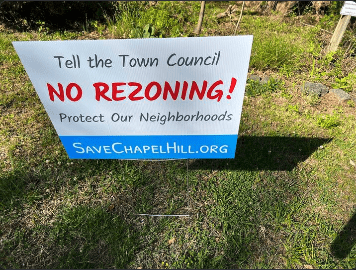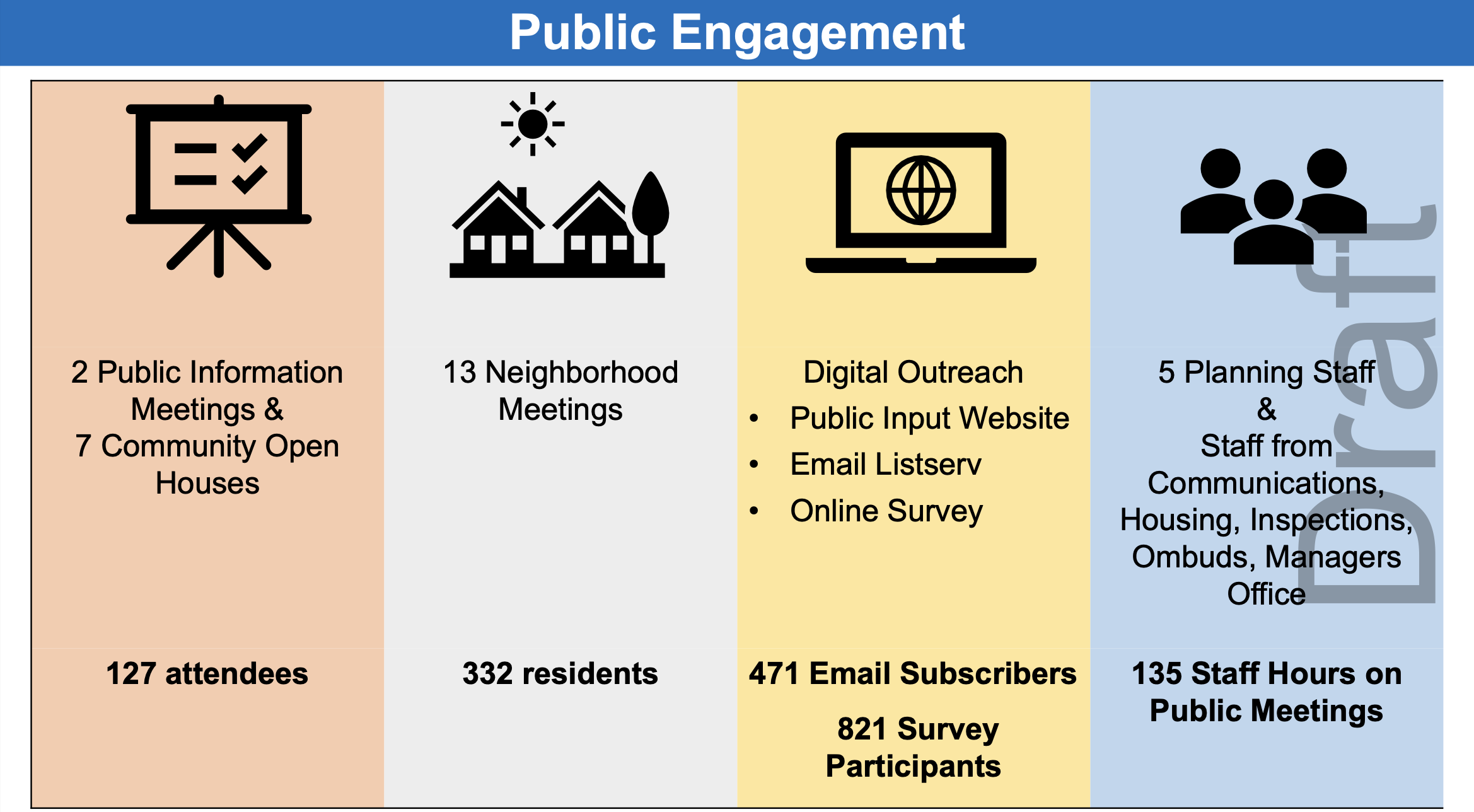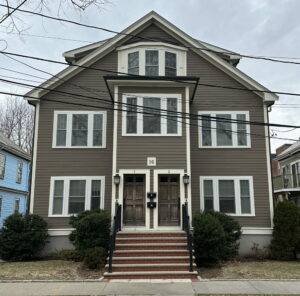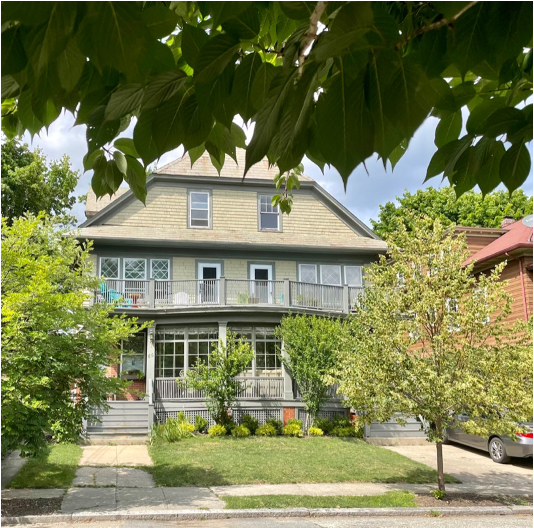A few days back we posted about some signs that popped up around town breathlessly directing the Town Council “No Rezoning!” and pleading to “Protect Our Neighborhoods” with a reference to the website SaveChapelHill.org. Well, that website went online yesterday — and it will likely be shared around many neighborhood listservs in the coming weeks. The picture features a house on Tinkerbell Road, but the website (for now) remains anonymous.

Gluttons for punishment that we are, we read through the site, and found that most everything is completely made up and/or wildly misleading. Here, we fact check what’s on the website, as of 4/14 — here’s an archived version of the complete website.
Let’s take a look at some of the website’s specific claims on the proposal page. (Here’s the archived version so you can see it.)
The Town Council has introduced a proposal to eliminate single-family home zoned neighborhoods across almost all of Chapel Hill.
Nope. This is NOT a rezoning. No one’s neighborhood is being rezoned. The allowed uses are changing. To allow ONE new type of housing. A house that’s basically two houses stuck together.
While the proposal is not finalized, some drafts have called for rezoning almost all R-1 single-family neighborhoods to R-4 multifamily fourplexes.
This is wildly misleading. First, a word about how this process works: town staff draft an initial proposal for the purpose of gathering input and assessing the temperature of the town. Then there’s public comment on the proposal from council and the community over many, many weeks, and then town staff rework the proposal.
Here’s what public engagement has looked like, so far:

The initial rough draft for allowing missing middle housing — cottage courts, duplexes, etc. — was proposed by town staff back in September 2022. In their initial draft, they proposed allowing up to four-unit buildings in most R-1 districts (specifically, those that are not within a Neighborhood Conservation District (NCD)).
That was before public input.
Following rounds and rounds of public input, town staff developed a revised proposal as of April 2023. This draft does not include fourplexes. At all.
They’re off the table.
The revised proposal draft, presented to the Council in early April, would allow duplexes by right in single-family neighborhoods. Again, not triplexes, not fourplexes, but duplexes. And they would be required to remain “house scale” and blend into existing single-detached neighborhoods — regulations like lot size, minimum width, minimum setbacks, maximum height, and impervious surface will not change. The rules that govern how big the buildings could be would be exactly the same; the only difference is how the inside is configured and who can live there.

We guess claims of duplexes aren’t as frightening as fourplexes, so that’s why the original proposal is emphasized, and the revised proposal mentioned nowhere.
Onto the second bullet point:
This rezoning plan is being presented as a ‘text amendment’ to Chapel Hill’s land use ordinance, a contested approach that attempts to circumvent the normal protocol for rezoning that requires ample notification, impact studies, and engagement with affected communities. (A similar attempt to “rezone by rewrite” is the subject of at least one lawsuit in Raleigh.)
Where to start!? The only thing that is marginally related to the truth is that when you rezone, or change the zone district that applies to the land to another zone district, there is a requirement to give more notification than when changing the text of the LUMO.
In this case, inadequate notification is not an issue. The town has held in-person meetings (where they got yelled at), virtual meetings, created social media, created a guide, created videos, wrote about the changes in platforms, discussed the changes in newspapers, notified the public through news organizations, and devoted 135 staff hours to conducting more than 19 community meetings. There was a survey. There was email outreach. A website was created. Outreach happened in many neighborhoods across Chapel Hill — any neighborhood or HOA that requested a meeting was granted a neighborhood-wide meeting (and they’re all on YouTube, so you can watch people yell at town staff from the comfort of their homes!) Check out all the neighborhoods that held meetings — and to the best of our understanding, every single neighborhood that requested a meeting, got a meeting.
The rest of the text is made up. This text amendment is not a “contested approach,” as we have discussed. The town’s actions are perfectly straightforward and legal, as we discussed last month.. Sure, some wealthy homeowners have filed a lawsuit against Raleigh, but all it takes to file a lawsuit is money, not wisdom or a solid legal argument.
You’re not going to get an “impact study” for the building of a duplex anywhere in Chapel Hill, or anywhere in the state for that matter. And any claim that there has been inadequate engagement is just silly. Again, there have been 13 neighborhood meetings, two public information meetings, multiple open houses, and other opportunities to learn about the proposal on every possible medium.
The proposal is set to be voted on in the coming months, and only one of the nine members of the town council (Adam Searing) has committed to stand with Chapel Hill residents and vote against it.
Adam Searing routinely spreads misinformation that we frequently fact check. He is CHALT’s guy on council, and refuses to even consider town staff’s modifications to the proposal that dramatically reduce its scope, so that’s accurate, we guess.
This proposal could expose our neighborhoods to unfettered, “by-right” development by wealthy institutions and investors in search of big profits on condos and rentals.For example: a wealthy out-of-state developer could buy a home in any formerly single-family zone—including historic neighborhoods, such as Franklin-Rosemary District—then tear it down, put up a fourplex of condos, and sell or rent them out without any community review or recourse.
So, this is what happens when you register a website domain in February but don’t launch it until April. We’ll once again point out: The proposal does not allow fourplexes in the R-1 zoning districts. It’s wildly inappropriate to gin up outrage about a proposal that doesn’t actually exist.
You can’t just buy houses and tear them down in a historic district. (There is a process for demo in the historic district; it’s lengthy and hard and involves lawyers and negotiations.) You can barely even put in new windows without an act of Congress. We have a Historic District Commission that debates things like outside lights. You’re not getting past them!
You’d think the anonymous authors of the website would give the town staff credit for walking back some of the changes, to make any gentle density even more gentle, but then it wouldn’t seem so scary and rile up people for election season.
Allowing multifamily buildings in neighborhoods designed for single-family homes would stress infrastructure such as roadways and utilities, as well as services such as sanitation and public safety.
More housing units mean more vehicular traffic—which could spell the end of the quiet, safe, walkable neighborhoods that make our communities such a desirable place to live.
Such drama! Anyhow, we’ve discussed this. There are no infrastructure concerns, and adding a duplex or two to an existing neighborhood will not have any noticeable impact on traffic. (We’re also curious how this would stress “public safety” — that seems a little um, gross and coded!) Water usage has remained down since OWASA introduced tiered rates and the university started using reclaimed water in the early 2000s.
This impacts everyone who cares about family-friendly communities, quality of life, and the environment.
We agree. Right now, only the wealthiest families can live in Chapel Hill — many of our teachers commute from more than an hour away. Everyone who cares about allowing more types of families to live here, increasing community vitality and helping preserve the environment by reducing the sprawling growth of our region should support the proposal. Currently, 40,000 people drive in to work in Chapel Hill every day. Adding a little more density in our neighborhoods will allow some of them to live in Chapel Hill — that’s fewer miles in cars and fewer trees clearcut elsewhere.
But that may not be what they mean.
Existing homeowners: Allowing multifamily developments alongside single family homes is likely to negatively impact existing property values, and could further burden families already struggling with the economic impacts of the pandemic and inflation.
Some of the opponents to the proposal claim this will increase property values. The anonymous Save Chapel Hillians claim it will reduce property values. Make up your minds. Either way, it’s hard to understand how this will be a “burden” on families, especially those who move into the neighborhoods and can live closer to work without an hour+ commute to work in our school district or at our university.
Prospective homeowners: Multifamily developments are more likely to be rentals, which could further reduce the limited supply of homes for sale to aspiring first-time homeowners.
We know several of the folks leading the charge against this proposal already own multiple single-family homes in Chapel Hill and rent out the excess, and we don’t hear much about that. This is another claim that has no factual support. (Many people buy a duplex for multigenerational households — meaning grandparents live in one half and their kids and grandkids live in the other.)
Chapel Hill Residents: Let’s be clear: we already have over 5,000 housing units in the pipeline for Chapel Hill, representing an astounding 25% growth rate. These units will come with growing pains that will be born indirectly (in the form of traffic, pollution, and reduced green space and tree cover) and directly (in the form of rising tax burdens ) by residents.
The numbers of “housing units in the pipeline” are made up, and the claim about the growing pains is something that has absolutely zero basis in fact. (If you visit the website, you’ll note there are no hyperlinks providing support for any of these assertions.)
Finally, at the bottom of the page there’s a ticker on a big red background that says “Rezoning could be passed in as little as 24 days.” Well, actually, no. Town Council is setting a new public hearing on the revised proposal for May 24, and a vote would follow at some point thereafter. You’ve still got more than a month to fearmonger and gather more and more emails to spread misinformation until Election Day.
Melody Kramer contributed to this article.

